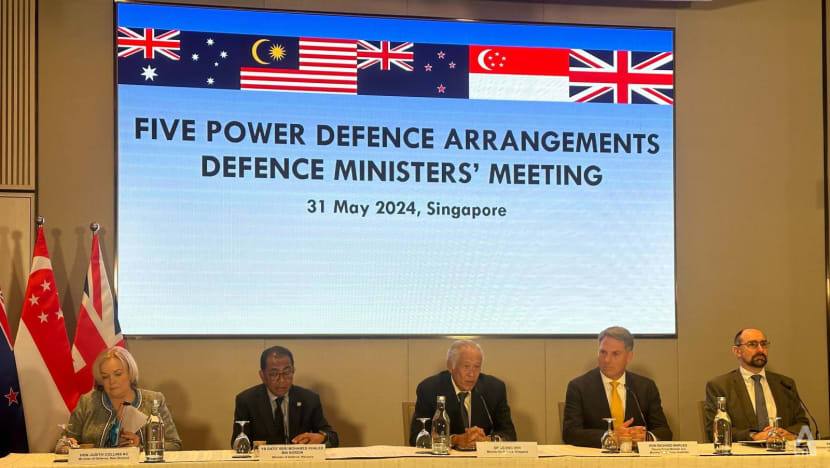Counterterrorism, non-conventional threats on agenda as regional defence bloc expands cooperation

(From left) New Zealand Defence Minister Judith Collins, Malaysian Defence Minister Mohamed Khaled Nordin, Singapore Defence Minister Ng Eng Hen, Australian Deputy Prime Minister and Defence Minister Richard Marles and the United Kingdom's Director General for Security Policy Paul Wyatt, during the joint press conference after the 12th Five Power Defence Arrangements Defence Ministers' Meeting on May 31, 2024. (Photo: CNA/Fabian Koh)

This audio is generated by an AI tool.
SINGAPORE: The Five Power Defence Arrangements (FPDA) will be expanding cooperation into non-conventional areas, such as counterterrorism, maritime security, humanitarian and disaster relief, as well as cyber and drone warfare.
The FPDA - formed in 1971 against the backdrop of armed conflict across Southeast Asia - comprises Singapore, Malaysia, Australia, New Zealand and the United Kingdom.
Singapore's Defence Minister Ng Eng Hen, who hosted the 12th FPDA Defence Ministers' Meeting at the Conrad Singapore Orchard on Friday (May 31), said the session was “very successful”.
TACKLING NON-CONVENTIONAL ISSUES
Speaking during a joint press conference after the meeting, Dr Ng said the leaders agreed that to keep the group relevant moving forward, it will work to boost its conventional war-fighting capabilities by including more high-end equipment.
“On the non-conventional, we did discuss and deliberate on the need for us to build capabilities in areas such as counterterrorism, maritime security, humanitarian as well as disaster relief. These will be the new areas that we will look into apart from the traditional threats,” said Malaysian Defence Minister Mohamed Khaled Nordin.
Australian Deputy Prime Minister and Defence Minister Richard Marles added that the group will also be looking at areas such as cyber and drone warfare.
He said that Australia will bring its F-35 Joint Strike Fighters to the next Exercise Bersama Lima – the joint military exercise between the FPDA’s member states – later this year.
"That will be the first time we'll have a fifth-generation aircraft participating in Bersama Lima," he added.
New Zealand Defence Minister Judith Collins added that her country will also deploy its P-8 Poseidon maritime patrol aircraft for the first time in that exercise.
Also at the meeting was the United Kingdom's Director General for Security Policy Paul Wyatt, who said that his country will look at how it can incorporate its upcoming Carrier Strike Group deployment into the FPDA’s plans.
TERROR THREAT REMAINS
Mr Marles said that terrorism “remains a feature of the world that we live in today”.
He said the group is making the decision not in response to a particular threat currently, but that it is building up its joint capability.
The threat of terrorism remains real and present, noted Dr Ng.
“Less than a decade ago, we had operators from Singapore, Malaysia (and) Indonesia who were based in Syria and the Middle East, who declared targets in this region,” he said.
“And I want to put on record our thanks to the UK, to Australia and New Zealand intelligence, that helped us monitor those terrorist elements, and in some instances negated them. Without their help, I'm quite certain that we will have real physical disasters in our region.”
The FPDA’s official website was also launched on Friday to help the public learn more about the group, providing additional insight into how the group functions as a defensive arrangement in the region.
Reflecting on the role of the FPDA in the region, Dr Ng said the group has “made significant progress” since its formation 53 years ago, calling it “the grandmother of multilateralism”.
“Back in 1971, many things didn't exist, but the FPDA was formed, and it still remains relevant today. We'll try to make it even more relevant for the future.
"It is reassuring for the government and the peoples of Malaysia and Singapore, and I think our neighbours,” he said.
During the press conference, the leaders reaffirmed their nations' commitment to the FPDA and agreed that the FDPA has "continued to build trust and interoperability among the militaries of member nations, promote respect for international law and contribute to peace and security in the region".
As part of the FDMM, the ministers will call on Prime Minister Lawrence Wong at the Istana.
The FDMM is held every three years, with Singapore and Malaysia taking turns to host. It is the highest decision-making platform of the FPDA.

















